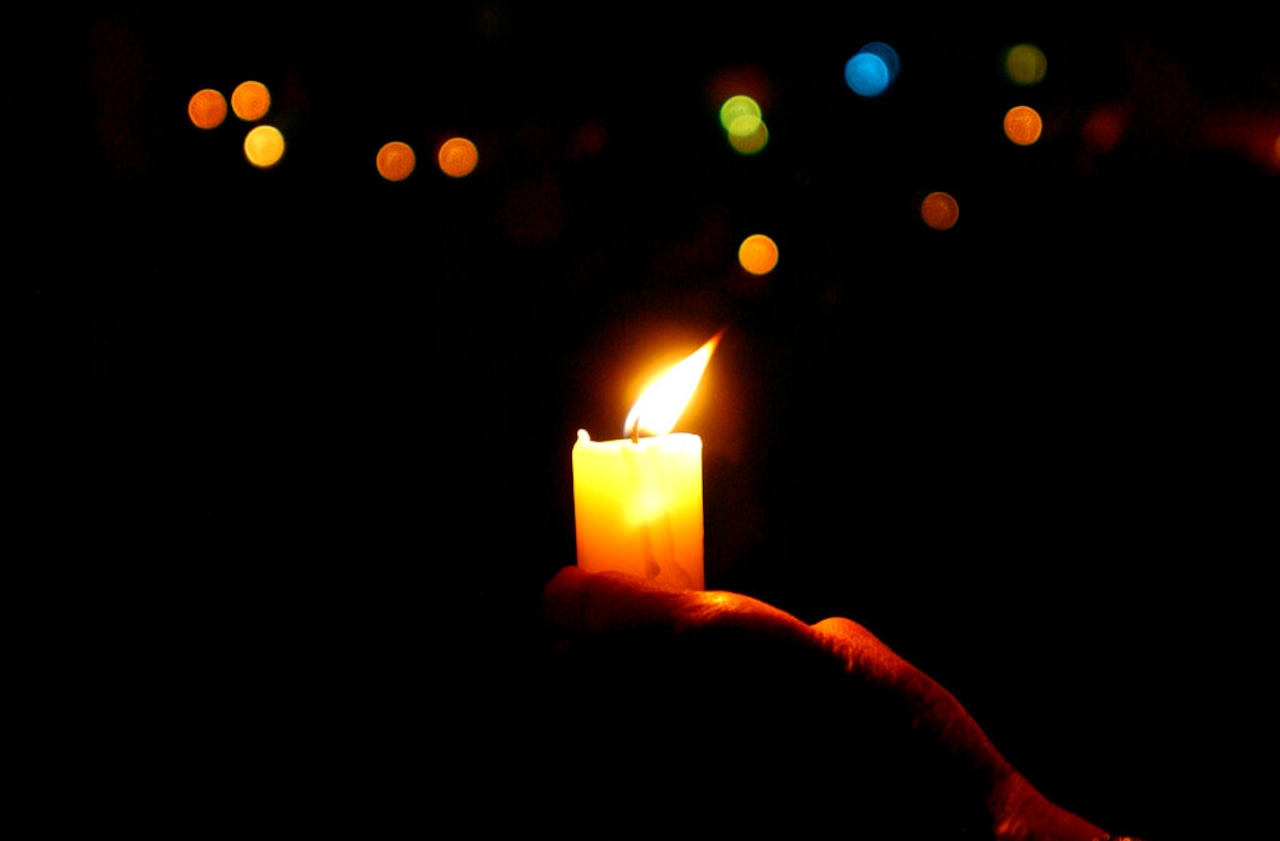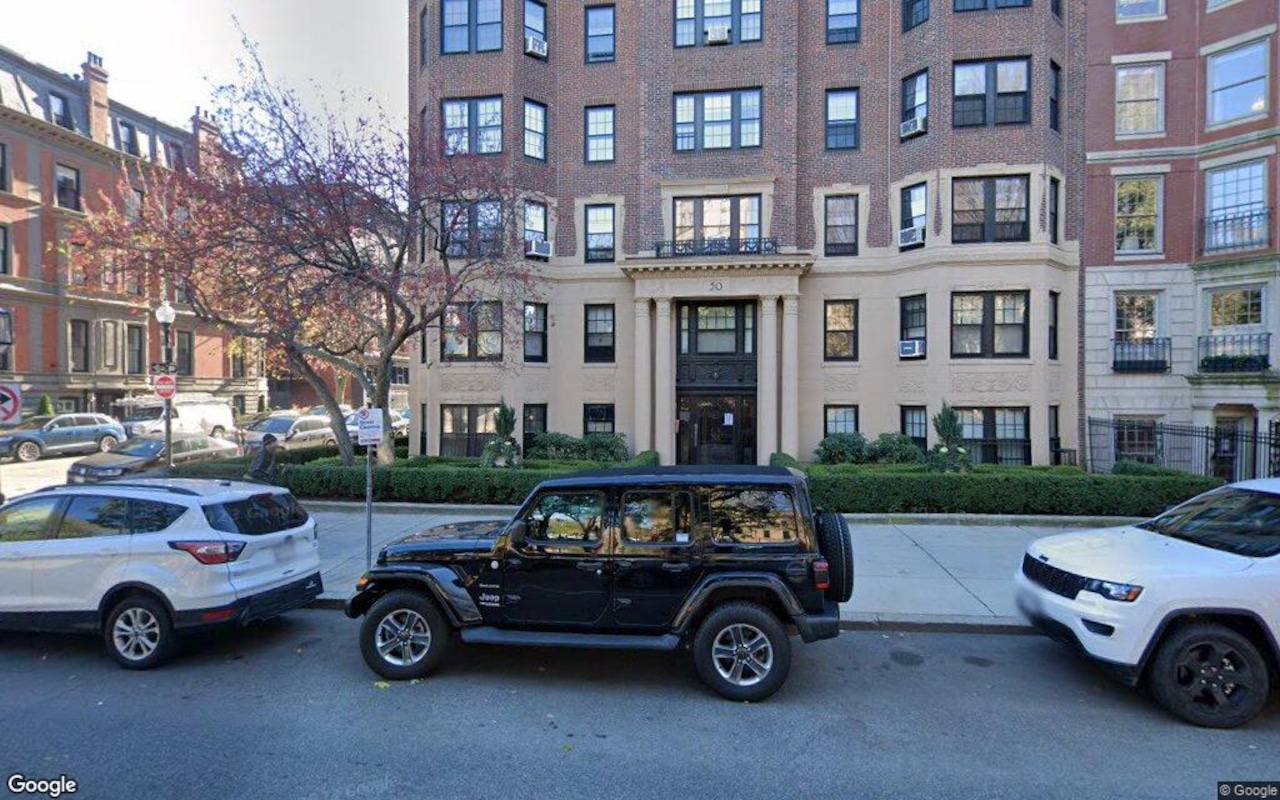When Robert Benjamin, former vice president of Multicultural Affairs at Eastern Nazarene College, learned the school would be closing, he learned something else: he had just a few months to vacate his campus housing.
Benjamin, who had worked at the school for nearly three decades, had recently submitted notice of his retirement plans.
“The immediacy of its closing was not so much surprising as it was stunning,” Benjamin said.
The college announced in June that it would be closing its doors in May 2025 because of financial woes.
While many in the college community and surrounding area knew of the college’s financial instability, closure wasn’t something on their minds, Benjamin said.
As news of the closure swirled the community, some employees, like Benjamin, processed not only the loss of the college but the housing they’d been living in. The college, in Quincy, is a highly sought-after neighborhood close to Boston.
“Many folks are disappointed, many are hurt,” Benjamin said. “It is because ENC, Eastern Nazarene College, the labor here — it’s going to sound cliché — it’s a labor of extreme love.”
While Quincy is a place Benjamin and his wife said they love, they couldn’t afford the high cost of housing in the area.
“This type of housing made it much more palatable,” he said, referring to his campus housing.
The couple bought a house instead in Virginia.
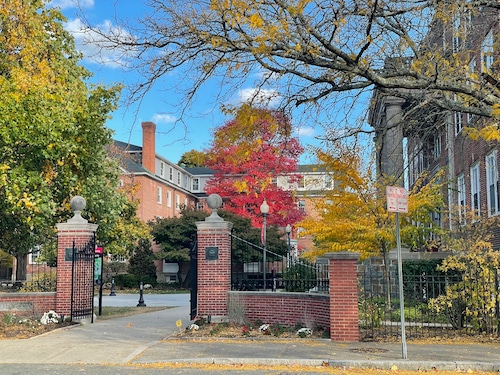
Eastern Nazarene College in Quincy to close by May 2025.Juliet Schulman-Hall
‘Waiting for the death to finally come’
On an unusually warm October fall day, the last people walking the soon-to-be-closed campus of Eastern Nazarene College in Quincy were the migrant families living in a building that has turned into a shelter. But even the shelter would be closing by the end of the calendar year, according to the college.
The loudest noise was the crunch of maroon leaves turning yellow beneath a shoe and the distant rumble of a leaf blower swirling into a plastic bag.
Professors and administrators like Benjamin were packing up their homes and most of the students had transferred.
Many people know each other in the densely single-family home area surrounding the college. And Eastern Nazarene College tends to be a source of connection and pride. Many neighbors are alums, former professors and administrators — or descendants of those who were.
Henry Neil’s family was also beginning to pack up their campus home — where they’ve lived for nearly two decades.
But they were also mourning the loss of his mother’s income as part of the college’s student finance department and Neil and his brother’s college experience.
The two were entering their junior year at the college and were offered tuition remission.
“I’m one of those kids who grew up on campus,” Neil said, adding that he is still processing the loss of his time at Eastern Nazarene College and the campus which “was my home for 20 years.”
Now Neil’s family is working on their next steps. Neil transferred to Gordon College and said he is enjoying his studies there, with hopes to become a pastor like his grandfather.
His parents are working with an organization for first-time home buyers to find inexpensive housing in the area but they don’t know where they’ll be living once they are asked to leave in February, Neil said.
His mother’s job with the college ends in December but she is beginning a part-time job at Savers as a cashier to have a stable income to be a good candidate as a home-buyer.
“I’m still mourning my time at Eastern Nazarene College, but finding moments of joy and hope at Gordon College,” Neil said.
David Young, associate professor of biblical literature, is also trying to figure out the best next steps for his family.
He moved to the neighborhood with his family five years ago for his job at Eastern Nazarene College.
After only being in the neighborhood for a few years, he said he is trying to stay there for the sake of his children but without secure full-time prospects confirmed, he has anxiety about the future.
Once an undergraduate student at the college, Young watched as the vibrancy of a campus of a few hundred students last year turned quiet.
Now there are 78 undergraduate and graduate students, according to the college.
“We’re experiencing a death,” Young said, likening the campus environment to waiting by a loved one’s hospital bed.
“You’re waiting for the death to finally come,” he said.
While he is grateful to be one of the last employees, keeping his job until December, all his classes have become asynchronous and remote. The four classes he expected to teach turned into one and a second six-week session for adult and graduate students, he said.

Eastern Nazarene College in Quincy to close by May 2025.Juliet Schulman-Hall
The long-awaited email
Before the email about closure, there were rumors. Texts from professors across the country offering apologies about the college closure and others asking if it was true.
The college had been facing financial pressures as its enrollment decreased. But it was working to expand its offerings to include more asynchronous remote education, said Benjamin, the former vice president of Multicultural Affairs.
There were plans for the future.
On a Tuesday afternoon, Young looked over Quincy Bay with his wife and two colleagues. Young had just finished his chocolate chip cookie dough ice cream at Baja Box, a taco and ice cream stand, when their phones lit up all at once.
The long-awaited email was here. The rumors were true. Eastern Nazarene College was closing.

Baja Box in Quincy.Juliet Schulman-Hall
“I thought I would teach at Eastern Nazarene College for the rest of my life. I wasn’t looking to move onto something else,” Young said.
Eastern Nazarene College was a transformative place for Young as a student. It was there that he deepened his view of Christianity, leading him on a path to become a pastor and later to earn his doctorate in biblical studies.
He wanted to do the same for other students.
“It’s a tough thing to commit your life to an institution and community that you love so much … and then we found out the same time as a large group of people,” Young said.
While each subsequent email sent to the community had “introductory platitudes,” the college never really sat down with the community to grieve what was being lost and to answer questions or concerns, Benjamin said.
The transition board at Eastern Nazarene College wrote in a statement that when closure “became the only prudent option,” the college reached out to families and employees to provide direct support and created an online resource for new information related to the closure.
“There is no good time to close a college, and the Board regrets the disruption the closure process has caused despite its best efforts to communicate as early and as clearly as possible,” the statement said. “We are all grieving the loss of this precious institution and hope that closing this door will open others for students, employees and the educational mission of ENC.”
The board also said they worked to quickly create teach-out partnerships to streamline student transfers and used its “limited cash and administrative resources to provide severance, re-employment opportunities, counseling and other support for employees.”
Folks from the MassHire Career Center came to offer support for employees of the college and there were job postings sometimes available and pastoral support, according to Benjamin. He said the offerings were “so much less than robust.”
After a “wonderful history” of serving a community, the school “lacked tremendously” as it wound down operations.
‘It was like a gut punch’
Loryn Fitch wasn’t one of the people who learned about the college closure from an email.
Benjamin didn’t want her to learn about the closure that way. He needed to tell her himself.
Sitting on the couch in the family room with her father, Fitch joked with her father, recollecting stories of her journey to Africa for a trip with Eastern Nazarene College.
She’d come home only three days prior. Fitch was still dealing with the time difference and not having a phone after losing it on the first day at the Nairobi Airport. Slumped on the couch, the two watched their typical comedy and cartoon shows and laughed.
That was when her father received a call from Benjamin. He asked if the two were together and to be put on speaker.
The college was closing. In unison, the father-daughter pair asked if he was joking.
“The mood shifted,” said Warren Fitch, Loryn’s father.
“It was like a gut punch,” said Loryn Fitch, who was about to go into her senior year.
She would begin a similar grieving and transition process both her parents had gone through at her age when their college, The King’s College in New York, closed in 1994.
“It brought me back to when I got the news,” Warren Fitch said, adding that the announcement was just as unexpected as it felt when he was going through it.
Instead of focusing on graduate school applications for a master’s in social work, Loryn Fitch spent the summer figuring out what she would do her senior year. She decided to transfer to Gordon College.
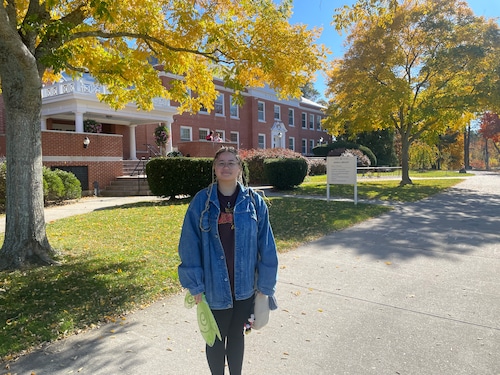
Loryn Fitch at Gordon College.Juliet Schulman-Hall
Fitch is still getting acclimated to Gordon College but is keeping busy with the theater program — something she said was cut before she came to Eastern Nazarene College — helping run the college’s social media and is part of Afro Hamwe, the college’s African student union.
“What makes me really sad is we really had something special and that time was cut short. We were really figuring out our foothold and figuring out what do we do with this unique Christian college campus that is unlike any other,” Fitch said, adding Eastern Nazarene College was unique in its racial diversity.
Living on a closing campus
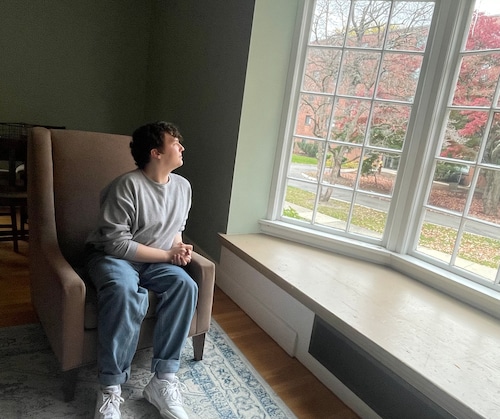
Wesley Mills, the last residential undergraduate student at Eastern Nazarene College, on November 4, 2024.Juliet Schulman-Hall
Wesley Mills is watching Eastern Nazarene College close. Unlike many of his peers who had to transfer, he is one of the 78 students who continued and is the last residential undergraduate student at the college.
After receiving the closure email — on his birthday — he fought to have campus housing and access to lab equipment to complete his biochemistry degree by December, Mills said.
As at least a fourth-generation Eastern Nazarene College student, Mills said he also wanted to stay because he knew he had a support system and wanted to finish what he had started.
“We call this the upside-down summer because everything has been turned on its head,” Mills said.
When he walks the campus, he only sees a few familiar faces. His day doesn’t consist of hanging out with friends or in-person classes. There are graduate students in a different part of the residential building whom he rarely sees walking around.
When he first came to Eastern Nazarene College, he said he didn’t feel like he belonged at the college because he is gay and doesn’t believe in God. While he found a community of people that were welcoming, now he’s without them.
“It’s very lonely. It’s funny because I didn’t realize how much a social life played in my college experience,” Mills said.
He is the only student in some of his classes and other classes are remote and asynchronous with only presentations and notes to look at. Even when he goes to the lab, he watches the equipment slowly disappear as it is donated or bought.
Sometimes he’ll venture to Gordon College to see some of his friends, sometimes they’ll come to him.
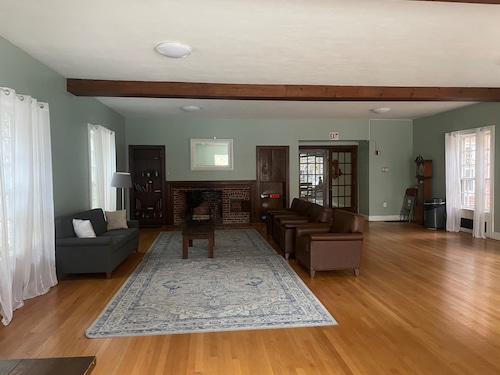
Munro Hall at Eastern Nazarene College.Juliet Schulman-Hall
As a motivated student, Mills said it has been difficult to find the energy to dedicate to his work without the social and educational atmosphere on campus.
Mills said he is exhausted, burnt-out and despite having around a month to finish his biochemistry degree, he feels like it is “far from being done.”
Just like his senior year in high school — which was online due to the pandemic — he is repeating a similar loss.
“There are times I resent that I don’t have a senior year,” Mills said.
But he is also trying to stay positive for his future, aiming to get his doctorate in biochemistry or chemistry and said he isn’t concerned about how a degree from a closed college might look on his resume.
“If anything it’ll be an interesting talking point,” Mills said, adding that someone might ask where the college is and he’ll respond:
“It’s nowhere.”




